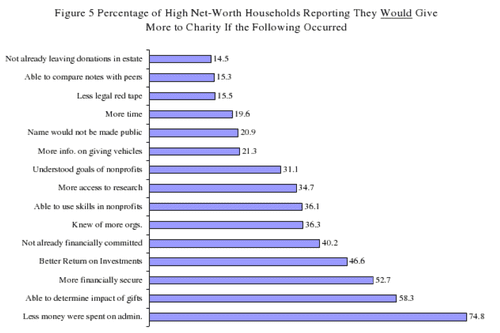What would make a donor give more to charity?
Back in 2006, a Bank of America / Indiana University study looking at the charitable motivations of high net-worth individuals identified a very simple fact.
It's a fact that at Bluefrog, we see time and time again in our research.
When donors are asked what would motivate them to give more, few talk about the attraction of an organisational brand, shared values or knowing more about the goals of a charity.
What is important is that they know the charity is using funds efficiently and effectively. Usually phrased in 'donor speak' as an organisation having 'low administration costs'.
Just behind, is the desire to determine what impact their gift makes. Donors want to know what their £100 or $100 has actually helped achieve.
It's a distinction around the concept of responsibility that more charities would do well to emphasise.
Though the charity is responsible for effective use of the donation, the donor is responsible for the life that is changed.
The more we recognise this simple fact and demonstrate it to our donors, the more money we will raise.
Tags In
Related Posts
3 Comments
Comments are closed.
The Essentials

Crack the Code to Regular Giving: Insights, Strategies, and a Special Giveaway!

‘Tis Halloween. Keep to the light and beware the Four Fundraisers of the Apocalypse!

Why do people give? The Donor Participation Project with Louis Diez.

A guide to fundraising on the back of a postcard

What does the latest research tell us about the state of fundraising?







Mark, sadly donors think that if Admin costs are low the non-profit is actually making more of a difference. In many cases, nothing could be futher from the truth. I believe if non-profits were MORE open to show donors what is “behind the curtain” coupled with what the true IMPACT of their gifts actually had, donors would accept higher admin costs. Why is it that if you do good, you have to be cheap, pay people low salaries, and not spend the money that needs to be spent in order to get the job done? We should have the best people, facilities and resources working on the world’s problems not the other way around.
Our industry and shoddy watchdog groups perpetuates this idea in the donor’s mind. Low overhead = better run non-profit. What would our industry actually look like if non-profits were judged based on results?
My belief is that only when donors really call for results will we see any change in the non-profit space. People like you, my friend Jeff Brooks, and other bloggers and industry experts, need to continue facilitate this thinking so the industry starts changing.
Hi Jeff
You make a good point. The belief that charities should be staffed by volunteers, concerned amateurs and people who work out of compassion is very strong in the UK.
And this impacts on their perception of charities operational activities. In short, donors don’t think charities are well managed.
A 2008 UK study – http://bit.ly/dnlDFL – asked charity donors what percentage of income they thought charities spent on admin and fundraising. The average estimate was 40% and 35% percent respectively.
When asked what they thought was an acceptable amount, the average was 11% on admin and 23% on fundraising.
I can’t think of many charities in the UK that spend anywhere near these amounts.
So when UK donors complain about high charity admin costs, they are complaining about a perception that has nothing to do reality.
But the perception continues to exist – for the very reasons you suggest. But I think the sector, in the UK at least, has to shoulder some blame as well.
And that relates directly to results.
By not sharing results with our supporters, we leave them in the dark. The result is they are left guessing about what difference their gifts have made. Add a few media horror stories to the mix and we can all see what conclusions are drawn.
If we can destroy the concept of admin costs as a measurement tool, we can make a massive change in people’s attitudes to giving. But this means we must provide donors with another means to judge charities.
I believe results are most definitely the alternative we should be looking at.
Great comment.
Thanks for reading.
Does anyone know how / where to obtain benchmark information, the Average percentage administrative costs for all UK charities (or at least a few of the larger ones?)
Also could a percentage be misleading if the total raised is in the billions?
Mind you, it would be very interesting to compare the percentage and total cash “turnover” between big not-for-profit charities and comparable corporate conglomerates.